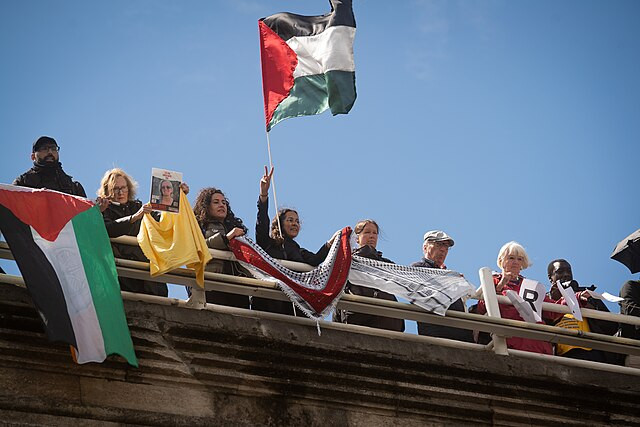Palestinian factions, including long-standing rivals Hamas and Fatah, have signed an agreement in Beijing aimed at ending their division and strengthening Palestinian unity. The announcement comes as Israel continues its military operations against Hamas in Gaza, highlighting China's growing role as a potential peace broker in the conflict.
The reconciliation talks, hosted by China and involving 14 Palestinian factions, concluded with a pledge to establish a provisional national reconciliation government. Chinese Foreign Minister Wang Yi described the agreement as a dedication to the "great reconciliation and unity of all 14 factions," underscoring the importance of the Palestine Liberation Organization (PLO) as the sole legitimate representative of the Palestinian people.
"The core outcome is that the PLO is the sole legitimate representative of all Palestinian people," Wang said. He added that the agreement includes provisions for post-Gaza war governance and the formation of an interim national reconciliation government.
The details of Hamas's role, which is not part of the PLO, in this new arrangement remain unclear. The future governance of Palestinian territories is still in question, especially following Israel's repeated vows to eradicate Hamas after the group's October 7 attack on Israeli territory.
I welcome the agreement between Fatah and Hamas aimed at strengthening Palestinian unity. The Beijing Declaration represents a promising step towards achieving Palestinian solidarity, so crucial for realising the rights of the Palestinian people. I commend the government of the… pic.twitter.com/Wgunyp0qNJ — Anwar Ibrahim (@anwaribrahim) July 23, 2024
Mustafa Barghouti, president of the Palestinian National Initiative and a participant in the Beijing talks, expressed optimism about the agreement. "All the parties have agreed that they should join the PLO, and that the organization is the only legitimate representative of the Palestinians," Barghouti said. Historically, Hamas and Fatah have experienced bitter enmity and multiple failed attempts at reconciliation. The Palestinian Authority (PA), dominated by Fatah, held administrative control over Gaza until Hamas expelled it in 2007 following a decisive victory in the 2006 legislative elections. Since then, Hamas has governed Gaza, while the PA has administered parts of the West Bank. The last significant attempt at reconciliation occurred in Cairo in October 2017, under the pressure of Arab states led by Egypt. Despite initial progress, the deal quickly collapsed into violence, culminating in an assassination attempt on Palestinian Authority Prime Minister Rami Hamdallah in 2018, which further exacerbated tensions.
#BREAKING: Palestinian factions #Hamas and #Fatah signed a declaration in #Beijing on ending the schism and strengthening Palestinian unity. Chinese Foreign Minister Wang Yi attended the signing ceremony.#China playing an important role in conflict resolution in the… pic.twitter.com/gQ5Rdo0zLW — Suldan I. Mohamed, MA (@SuldanMohamed_) July 23, 2024
Barghouti emphasized that the current war in Gaza has galvanized Palestinian factions to unite against Israeli occupation. "There was a very clear feeling that what Israel is doing is really threatening everybody," he said. "In that sense, the feeling of unity to confront the Israeli side is very clear here."
Tahani Mustafa, a senior Palestine analyst at the International Crisis Group, urged caution. "Most Palestinians will be taking the news about reconciliation with the usual caution and pessimism," she said. "The major issues that have proven to be obstacles to reconciliation in the past were not addressed. It's very unlikely anything substantial will come out of this, especially as the biggest obstacle so far has been [Palestinian Authority president and Fatah leader] Mahmoud Abbas and his absolute reluctance to relinquish any part of his monopoly on power."
At a news conference in Beijing, Hamas delegation representative Mousa Abu Marzook stated that they had reached an agreement to complete a "course of reconciliation," while defending the group's October 7 attack on Israel. "We're at a historic junction. Our people are rising up in their efforts to struggle," he said, asserting that the operation had significantly altered the international and regional landscape.
China's role in brokering this agreement is part of its broader strategy to enhance its influence in the Middle East. Since the start of the Gaza conflict, China has positioned itself as a vocal advocate for Palestinian statehood and a critic of Israeli actions. Chinese leader Xi Jinping has called for an international peace conference and dispatched a special envoy to the Middle East to engage with diplomats and officials.
The agreement, termed "The Beijing Declaration," is a notable diplomatic effort by China, which previously brokered a peace deal between longtime rivals Saudi Arabia and Iran. Despite skepticism about Beijing's geopolitical clout in a region traditionally dominated by the United States, this move underscores China's ambitions to present an alternative vision for global diplomacy.
The announcement coincides with Israeli Prime Minister Benjamin Netanyahu's visit to the United States, where he will meet top officials and address Congress. The ongoing conflict has resulted in significant casualties and a humanitarian crisis, with more than 39,000 Palestinians reported dead.






